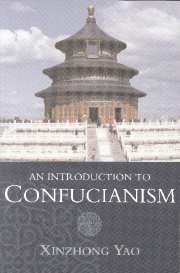Book contents
- Frontmatter
- Contents
- List of illustrations
- Preface
- Confucianism in history: chronological table
- Introduction: Confucian studies East and West
- 1 Confucianism, Confucius and Confucian classics
- 2 Evolution and transformation – a historical perspective
- 3 The Way of Confucianism
- 4 Ritual and religious practice
- 5 Confucianism and its modern relevance
- Select bibliography
- Transliteration table
- Index
- Plate section
1 - Confucianism, Confucius and Confucian classics
Published online by Cambridge University Press: 05 June 2012
- Frontmatter
- Contents
- List of illustrations
- Preface
- Confucianism in history: chronological table
- Introduction: Confucian studies East and West
- 1 Confucianism, Confucius and Confucian classics
- 2 Evolution and transformation – a historical perspective
- 3 The Way of Confucianism
- 4 Ritual and religious practice
- 5 Confucianism and its modern relevance
- Select bibliography
- Transliteration table
- Index
- Plate section
Summary
About 2,500 years ago, a man was born to a once aristocratic family in a small state called Lu in East China. During his lifetime, the man endeavoured to work ‘towards a goal the realisation of which he knows to be hopeless’ (Lunyu, 14: 38), carrying forward the old tradition in a chaotic environment and opening up a new horizon in a dark age. By the time he died at the age of seventy-three, his teachings had spread throughout the state and beyond. His disciples and students compared him to the sun and moon, while his rivals considered him a man ‘who does not work with his arms and legs and who does not know how to distinguish between different kinds of grain’ (Lunyu, 18: 7). But there was one thing that neither side knew: that Chinese culture, and to some extent, East Asian culture, would be forever linked with his name, and that the tradition he loved and transmitted would rank with the greatest in the world. This tradition is known in the West as ‘Confucianism’.
‘Confucianism’ and ru
The origin of the English word ‘Confucianism’ may be traced back to the Jesuits of the sixteenth century:
Until Nicholas Trigault published his version of Ricci's journals in 1615, there was hardly any knowledge of, not to say debate about, Confucianism … […]
Information
- Type
- Chapter
- Information
- An Introduction to Confucianism , pp. 16 - 67Publisher: Cambridge University PressPrint publication year: 2000
